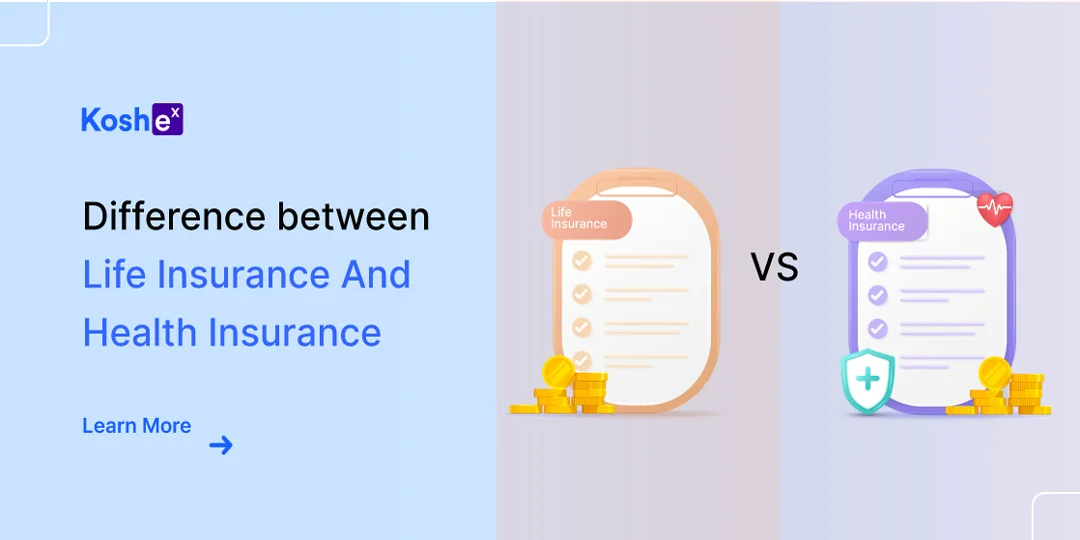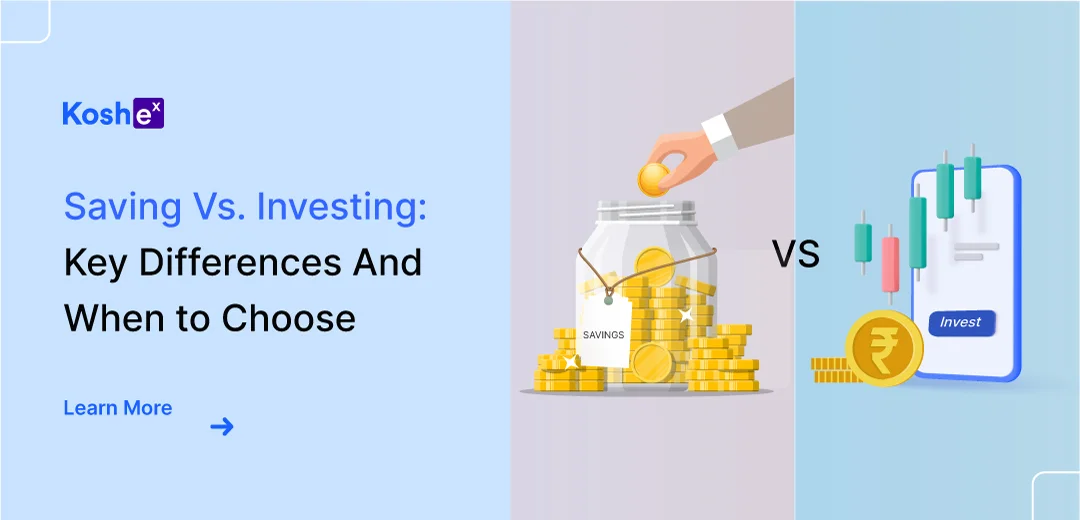Many use the terms, life insurance, and health insurance, interchangeably. They think that both types of insurance cover the same aspects. However, that’s not true. In this article, we will be talking about the differences between both insurances and how they can benefit you.
Indians are slowly moving away from fixed deposits and investments in gold and real estate to other financial products. According to a Crisil report titled ‘The Big Shift In Financialisation’, over half of Indians’ savings are invested in shares, mutual funds, and insurance. The opportunity to create a big corpus and save taxes might attract many toward insurance.
Let’s dive deep and understand the definition of life insurance and health insurance.
What Is Life Insurance?
Life insurance is a financial safety net that ensures the well-being of your family in your absence. A life insurance policy is like a contract between a policyholder (you) and the insurer (the company), where the insurance company offers a predefined sum assured amount to the nominees/beneficiaries after the untimely demise of the policyholder in exchange for the premium. This is as per the terms and conditions of the chosen plan.
If you are the only breadwinner of your family, life insurance becomes more essential for you than others. The money that the insurance provider pays to your family can be used for meeting their day-to-day expenses and long-term expenses. It can be used to pay off debt as well. Hence, life insurance will offer financial support to your family so that they don’t struggle when you are not there anymore to look after them.
What Are The Benefits Of Life Insurance?
There are several benefits that you get from investing in a life insurance policy. Here is a list of benefits.
Financial Security – Investing your money in a life insurance policy will act as a safety net during unpredictable situations. Hence, in the policyholder’s absence, their family stays protected.
Risk Coverage – Insurance offers risk coverage to the insured family in the form of monetary compensation in lieu of the premium paid.
Long-Term Savings Option – Insurance plans can help you make systematic savings and create a corpus, which can be used to achieve your long-term goals, such as building a new house and financing your child’s education and marriage.
Different Options – Insurance companies offer different types of plans to the insured depending on their need for insurance. More benefits come with a higher premium.
Guaranteed Income – Insurance policies offer a guaranteed sum assured amount, which is payable on happening of any unexpected event.
Loan Facility – Insurance companies offer the option to the insured so they can borrow a certain sum of amount. This option is available on selected policies only.
Tax Benefits – With life insurance plans, you get tax benefits under prevailing laws as per the Income Tax Act, of 1961. The insurance premium paid can be availed as a tax deduction under Section 80C of the Income Tax Act, 1961. You can avail of a deduction of up to ₹1.5 lakhs under Section 80C.
What Is Health Insurance?
Health insurance is an insurance product that covers the medical and surgical expenses of an insured individual. It is a contract between a policyholder and the insurer and it will cover medical expenses that might occur because of illness, injury, or accident.
If you have a health insurance policy, then some or all the medical expenses will be borne by the insurance company against which an insured is supposed to pay a certain amount known as a premium.
What Are The Benefits Of Health Insurance?
There are several benefits that you get from investing in a health insurance policy. Here is a list of benefits.
Hospitalization Expenses – People buy health insurance policies to protect their finances against increasing medical costs. An accident or medical emergency could cost you a lot of money. When you have a medical insurance plan, you can enjoy cover for everything from ambulance charges to daycare procedures. This will make it easier for you to get the care you need to recover.
Pre & Post Hospitalization Charges – Pre-hospitalization expenses like diagnosis expenses and doctor’s fees, etc., can be covered by a health insurance plan. Expenditures post-release such as medication, routine check-ups, injections, etc., are also reimbursed by most insurance providers. Compensation funds against the same can be extracted as a lumpsum amount, or by producing respective bills.
Cashless Claims – Usually, every health insurance provider will partner with a number of network hospitals where you can enjoy cashless claims. This makes the entire process of receiving emergency medical care much easier. At a network hospital, you are not needed to pay for any of the covered treatments. For all valid claims, the insurers will take care of the medical costs, without you having to pay for anything, apart from non-covered expenses and the mandatory deductibles.
0% Co-Payment – Many renowned insurance companies cover the entire medical bills generated during the treatment procedure of an insured individual, up to the sum insured amount. Zero co-payment reduces the financial liability of patients, which allows them to focus only on recovery.
Tax Benefits – The premiums paid towards the upkeep of your health insurance policies are eligible for tax deductions under Section 80D of the Income Tax Act, 1961. You can claim a deduction of up to ₹25,000 per person from your taxable income for a policy of yourself, your spouse, your children, and parents below the age of 60. If you have purchased a policy for a parent who is over the age of 60, you claim an additional deduction of ₹50,000.
What Are The Differences Between Life Insurance & Health Insurance?
So far, we have explained both types of insurance in detail. In this table, we will be talking about the differences in an easy-to-understand format.
| S. No | Life Insurance | Health Insurance |
| 1 | Life Insurance provides an assured sum to the beneficiaries in the eventuality of the insured’s demise. | Health Insurance covers the cost of hospital/surgical expenses if the insured person is hospitalized. |
| 2 | It covers financial risk/loss of income related to the insured’s death. | It covers the financial risk associated with hospitalization because of illness, injuries, and related expenses. |
| 3 | It is a long-term plan. | It is a short-term plan. |
| 4 | It includes survival and death benefits at the end of your insurance policy. | No survival or death benefits are offered to the insured unless mentioned specifically. It only caters to the recent treatment charges and medical needs. |
| 5 | As per the insurance policy, premiums are both fixed and flexible. | Premiums are usually fixed. |
| 6 | Tax benefits for a premium paid as per Section 80C of the Income Tax Act. | Tax benefits as per Section 80D of the Income Tax Act. |
In The End…
Life insurance policies help safeguard one’s family at the demise of the policyholder. Health insurance policies help the policyholder with their medical expenses. Apart from helping the policyholder’s family after their sudden demise, life insurance policies can also act as long-term savings instruments and help them achieve their long-term goals. Many use life insurance policies for their retirement corpus.
We hope you understand all about life insurance, and health insurance, and their differences. We believe this article will help you choose the right insurance for you. If you like to read more articles on personal finance, mutual funds, and other investment instruments, head over to our Blogs section.
Want to manage your money better and organize your finances efficiently? Create an account with Koshex to track your net worth, build excellent savings habits, invest in personalized recommendations, and track the performance of your investments.
We are truly built for every Indian Smart Saver and Super Wealth Creator.









Leave a Comment